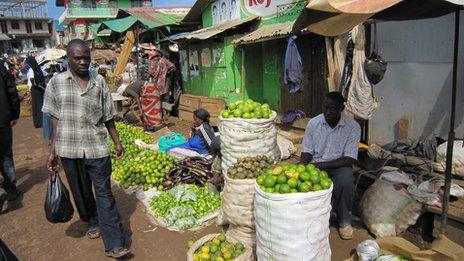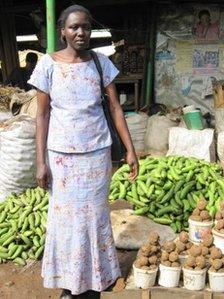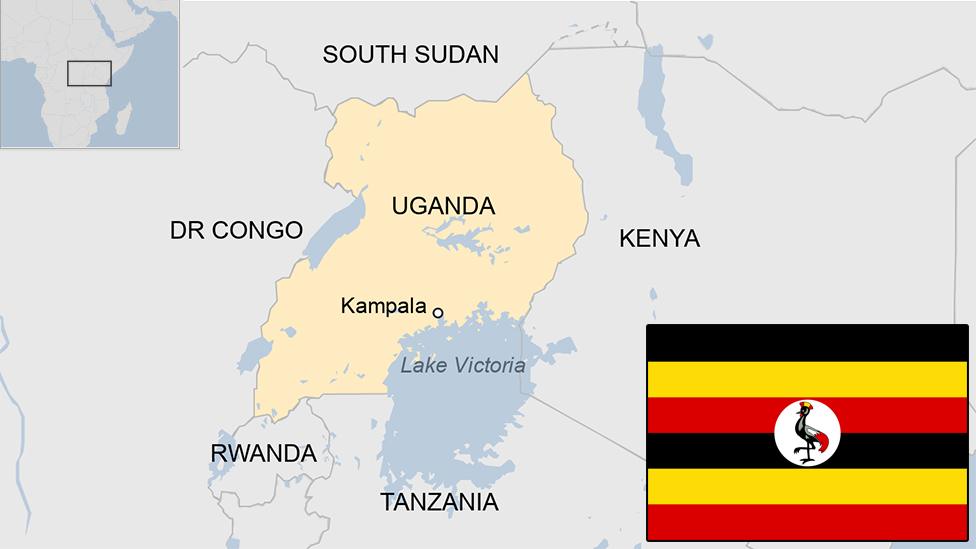Rapidly rising inflation hits Ugandans hard
- Published

People are having to cut back as basic foods have become more expensive
The rapidly rising inflation rate that Uganda is experiencing is hitting ordinary people hard.
Prices have gone up by 30% in the past year, according to the latest data from the country's statistics office, published on Monday.
But the cost of food has gone up by much more than that - those prices have risen by 45%.
At Gabba market in the east of the capital Kampala, there are piles of sweet potatoes, bright red tomatoes, chickens crammed into cages.
Single mother of two Rita Kyomukama, 34, checks the price of everything carefully.
As she walks along a muddy walkway between the many stalls, she says she is shocked at the sharp increases in the cost of food.
"I find that it's difficult for me, according to the salary I get. You have to be careful with everything, keep on checking the prices," she says.
A butcher is chopping goat meat into portions, as flies buzz around joints of beef hanging from hooks.
Transport costs
Rita explains the rise in the cost of beef means she and her children can hardly eat it these days.
"We used to eat it three times a week. Now it's more like twice a month."
Butchers say the rising cost of petrol means their transport costs are more expensive, something they have to pass on to their customers.
The staple food in most Ugandans' diet is matooke, which looks like a fat green banana.
The cost of a bunch of matooke has risen a lot, particularly putting pressure on the household budgets of many of the poorest.
It went up 23% between August and September 2011.

Rita Kyomukama is relying more on cheaper food stuffs like matooke
The central bank, the Bank of Uganda, blames a combination of factors for the rise in prices.
Its governor, Emmanuel Tumusiime-Mutebile, says global financial turmoil and the drought in east Africa have all played their part.
"It's a wider problem. It's just that Uganda is higher for various reasons," he says.
"You must understand that Uganda is producing food for the rest of the region and the government has rightly refused to ban food exports," he adds.
But Augustus Nuwagaba, a professor of economics from Makerere University, is not convinced by part of that.
"The impact should have been the same in all the countries in the same ecological zone, implying there is definitely another internal reason," he says.
"This reason is management of fiscal policy, especially during the elections when a lot of money was spent," he says.
An increase in government spending preceded February's presidential elections, when the incumbent Yoweri Museveni was re-elected.
In January, inflation stood at just 5%. But the central bank governor says government spending is not to blame for the higher inflation.
Back at Gabba market, it seems the price rises are bad news for stallholders as well as shoppers.
Chris Rugambo runs a stall selling pulses, rice and flour, situated in a prime slot near the entrance to the market.
But he says customers are spending less as they're careful with how they spend every shilling.
"Somebody who has been buying 2kg for a family is now buying a quarter of that because they cannot afford to buy 2kg now."
Chris is particularly surprised at the leap in the price of sugar. It went up by 36% from August to September.
Men on bicycles strap lengths of sugar cane to the back of their bikes as they weave through Kampala's heavy traffic.
The sweetener, grown in Uganda, is in big demand.
Aware of public anger at the cost of sugar, the government is keen to point the finger at sugar manufacturers.
Hopes for future
The Trade Minister Amelia Kyambadde says companies are profiteering, something the firms deny.
"I suspect they might be making profits of maybe 40%," she says.
So the government has made a high profile display, demanding sugar companies publish their production costs. It has also requested bigger imports of sugar.
"With the importation of more sugar, I believe that has created a bit of apprehension among the manufacturers," says the trade minister.
"We are sure by next year there will be a difference."
The Bank of Uganda has hiked interest rates several times over the past few months to try to halt the rise in inflation.
The bank's governor says he expects inflation to come down within the next few months.
"Food price inflation will peak and then come down rapidly. I am certain by the middle of next year inflation will be in single figures," he says.
That means however that in the short term, there are likely be more price rises to come.
- Published26 April 2023
